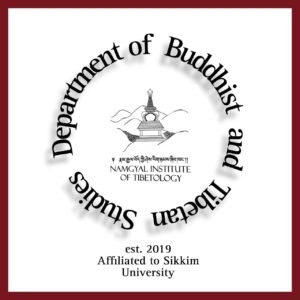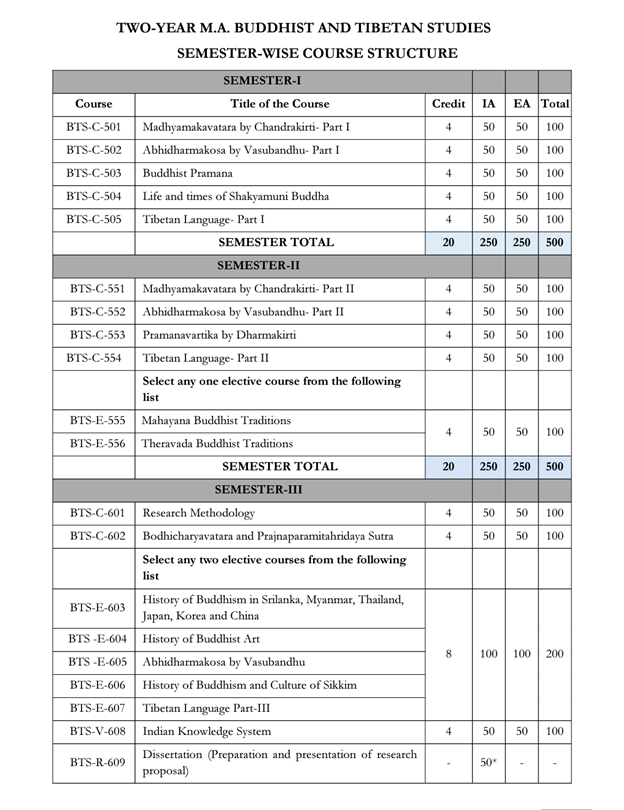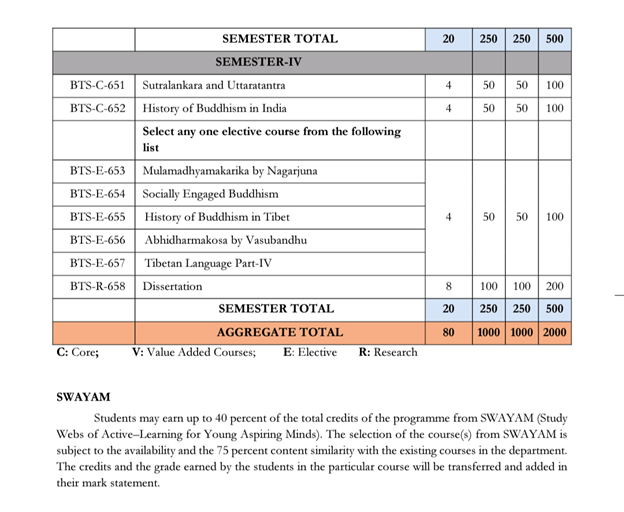
Admission notice for Masters in Buddhist and Tibetan Studies 2025-26
Prospectus 2025-26
Final Annual report 2024-25
Admission notice 2025-26
Final Admission Form 2025-26
Prospectus 2025
Prospectus 2025-26
Final Annual report 2024-25
Admission notice 2025-26
Final Admission Form 2025-26
Prospectus 2025
The Department of Buddhist and Tibetan Studies
The establishment of Buddhist University is a follow up of the announcement made by the then Chief Minister of Sikkim, on the auspicious occasion of the 80th birthday celebration of His Holiness the Dalai Lama on July 6, 2015 to establish a Buddhist University. After extensive meetings and consultations with relevant state government departments and associated organizations, the decision was made to establish the Buddhist University under the auspices of the Namgyal Institute of Tibetology (NIT). Additionally, a bill was successfully passed in the Sikkim State Assembly to formalize this initiative.
So, in 2019, the Department of Buddhist and Tibetan Studies was established under the affiliation of Sikkim Central University. The department aims to lay the groundwork for a comprehensive Buddhist University in the coming years.
The Department offers a two-year Postgraduate Degree Program.
It Plays an important role in preserving the ancient Nalanda system of education which existed long before the modern universities of the western world.
The treatises of the great Nalanda Masters are an integral part of the curriculum of the course, and they are invaluable sources of wisdom. Now, students from various backgrounds have the opportunity to study this subject at the university level, using English as the medium of instruction—a language widely understood worldwide
The two-year M.A. in Buddhist and Tibetan studies has been designed to provide learners with a comprehensive and interdisciplinary journey into the heart of Buddhist and Tibetan thought, fostering a deep engagement with their historical, philosophical, and cultural aspects. Guided by the principles of holistic education, the program’s foundation rests upon eight attributes, each resonating with distinct facets of intellectual and personal growth. These attributes encompass disciplinary knowledge and understanding, critical thinking, philosophical inquiry, value inculcation, communication skills, lifelong learning, multicultural competence and research prowess. The post graduates of this course are expected to emerge not only as custodians of these traditions but also as catalysts for their continued evolution in a dynamic global context.
Course Objectives:
- Understand the foundational principles and key concepts of Buddhism.
- Explore the historical development of Buddhism and its spread across different regions.
- Analyze the main branches and schools of Tibetan Buddhism.
- Investigate the cultural and social dimensions of Buddhism.
- Engage with primary texts (Sutras) and scholarly literature in the field of Buddhism.
- Understanding the historical and philosophical context of Middle Way philosophy by examining its fundamental principles, including the concept of emptiness (Sunyata), dependent origination, and the Middle Way between extremes.
- Exploring the origin and evolution of Buddhist art in India and study of different artistic styles and regional variations of Buddhist art, including the Gandhara and Gupta traditions.
- To promote Buddhist Studies, and expand the scope of Research and Development in the field of Buddhism
- An opportunity for scholars to pursue a program in Humanities that would enhance their Emotional Intelligence Quotient.
- Exhibit responsible citizenship through contributions to societal welfare, informed by the values instilled by Buddhist and Tibetan philosophies.
- Gain ability to articulate thoughts, engage in scholarly discourse, and foster cross-cultural understanding using both oral and written forms of communication in Tibetan
- Cultivate a passion for lifelong learning, engaging in independent exploration to enhance and expand personal knowledge.
- Foster an inclusive and culturally sensitive approach to interactions, contributing to a harmonious global community by promoting cross-cultural understanding and collaboration.
- An opportunity for students to receive a Unique Degree from a reputed Central University.
- Embrace a growth mindset exhibiting adaptability and resilience in the face of evolving personal, social, academic and professional challenges.
- Apply critical thinking skills to assess and dissect intricate philosophical concepts within the context of Buddhist and Tibetan studies.


*The minimum admission requirement is a three-year undergraduate degree from a university recognized by the University Grants Commission (UGC).
Department of Buddhist Studies (Sikkim University)
Namgyal Institute of Tibetology has signed a MoU with Sikkim University for introduction of two years Post-Graduate Program in Buddhist Studies from the present academic session in the Namgyal Institute of Tibetology. The new department is functioning directly under Sikkim University, though the responsibility of providing classrooms and teachers have been given to the institute.
Faculty members
- Dr Tsewang G Bhutia – Head of the Department
- Dr Jigme Losel- Assistant Professor
- Dr Tashi Pintso Lepcha- Assistant Professor
- Mr Anup Gurung- Assistant Professor
- Mr Sonam Zawa Bhutia – Assistant Professor
- Mr Kunzang Namgyal Shangderpa – Assistant Professor
- Mr Tenzing Longsel Barphungpa – Assistant Professor
- Mr Norbu Gurung – Guest Faculty (MA Buddhist Studies, SU)
Non-teaching Staff
- Mrs Tseten Ongmu Shangdarpa – LDC
- Mrs Nekit Lepcha- Office Attendant